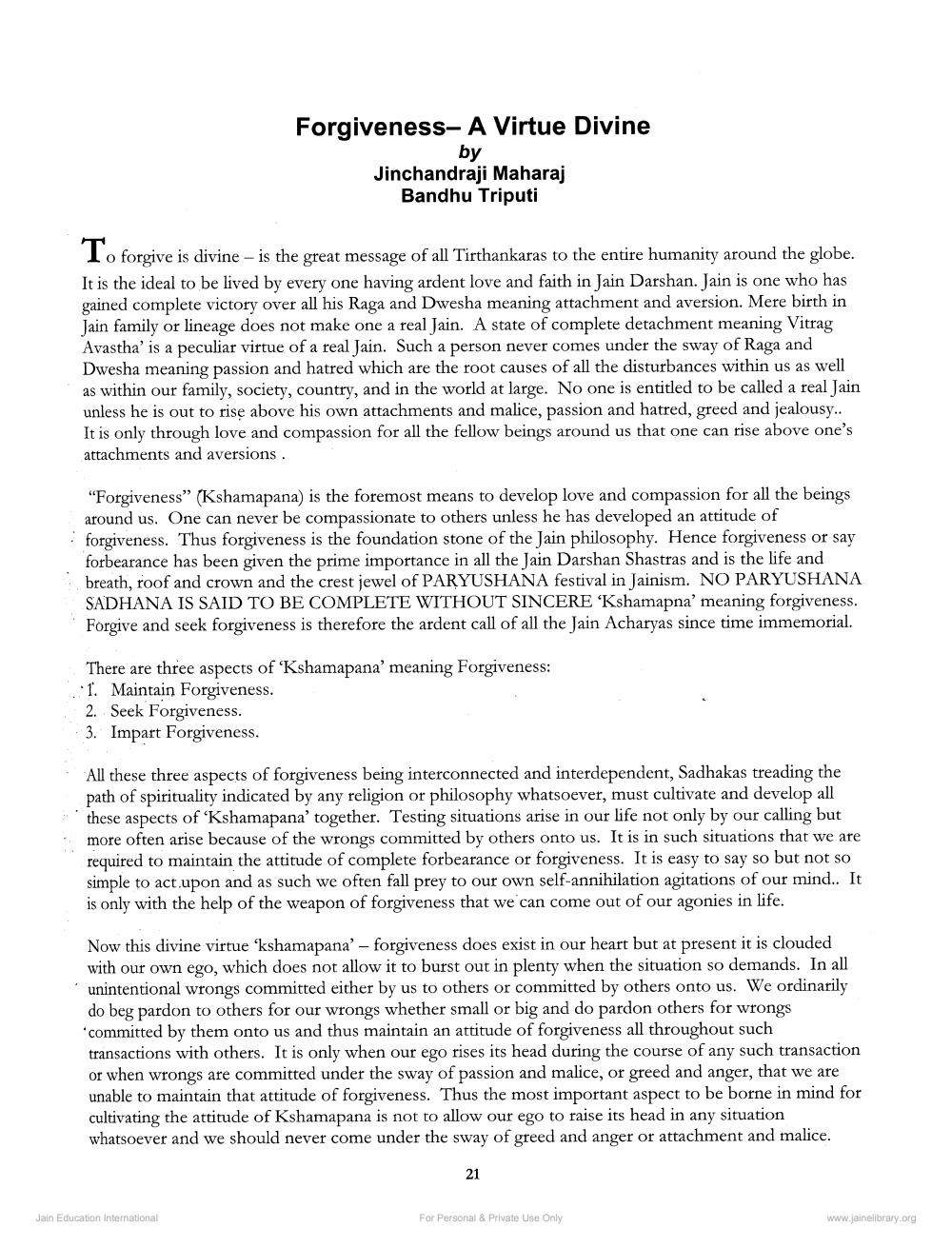________________
Forgiveness- A Virtue Divine
by
Jinchandraji Maharaj
Bandhu Triputi
Io forgive is divine - is the great message of all Tirthankaras to the entire humanity around the globe. It is the ideal to be lived by every one having ardent love and faith in Jain Darshan. Jain is one who has gained complete victory over all his Raga and Dwesha meaning attachment and aversion. Mere birth in Jain family or lineage does not make one a real Jain. A state of complete detachment meaning Vitrag Avastha' is a peculiar virtue of a real Jain. Such a person never comes under the sway of Raga and Dwesha meaning passion and hatred which are the root causes of all the disturbances within us as well as within our family, society, country, and in the world at large. No one is entitled to be called a real Jain unless he is out to rise above his own attachments and malice, passion and hatred, greed and jealousy.. It is only through love and compassion for all the fellow beings around us that one can rise above one's attachments and aversions.
"Forgiveness” (Kshamapana) is the foremost means to develop love and compassion for all the beings around us. One can never be compassionate to others unless he has developed an attitude of forgiveness. Thus forgiveness is the foundation stone of the Jain philosophy. Hence forgiveness or say forbearance has been given the prime importance in all the Jain Darshan Shastras and is the life and breath, roof and crown and the crest jewel of PARYUSHANA festival in Jainism. NO PARYUSHANA SADHANA IS SAID TO BE COMPLETE WITHOUT SINCERE Kshamapna' meaning forgiveness. Forgive and seek forgiveness is therefore the ardent call of all the Jain Acharyas since time immemorial.
There are three aspects of Kshamapana' meaning Forgiveness: 1. Maintain Forgiveness. 2. Seek Forgiveness. 3. Impart Forgiveness.
All these three aspects of forgiveness being interconnected and interdependent, Sadhakas treading the path of spirituality indicated by any religion or philosophy whatsoever, must cultivate and develop all these aspects of Kshamapana' together. Testing situations arise in our life not only by our calling but more often arise because of the wrongs committed by others onto us. It is in such situations that we are required to maintain the attitude of complete forbearance or forgiveness. It is easy to say so but not so simple to act upon and as such we often fall prey to our own self-annihilation agitations of our mind.. It is only with the help of the weapon of forgiveness that we can come out of our agonies in life.
Now this divine virtue ‘kshamapana' - forgiveness does exist in our heart but at present it is clouded with our own ego, which does not allow it to burst out in plenty when the situation so demands. In all unintentional wrongs committed either by us to others or committed by others onto us. We ordinarily do beg pardon to others for our wrongs whether small or big and do pardon others for wrongs 'committed by them onto us and thus maintain an attitude of forgiveness all throughout such transactions with others. It is only when our ego rises its head during the course of any such transaction or when wrongs are committed under the sway of passion and malice, or greed and anger, that we are unable to maintain that attitude of forgiveness. Thus the most important aspect to be borne in mind for cultivating the attitude of Kshamapana is not to allow our ego to raise its head in any situation whatsoever and we should never come under the sway of greed and anger or attachment and malice.
21
Jain Education International
For Personal & Private Use Only
www.jainelibrary.org




